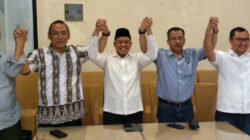Leadership is an important aspect of any successful organization, whether it be in the corporate world or in politics. In this post, we will be discussing different types of leadership and their characteristics, as well as the benefits of effective leadership and how you can become a better leader.
Menepis Bias Gender Dalam Kepemimpinan Politik Lokal
The issue of gender bias in leadership is one that has been prevalent for a long time, and is still an important topic of discussion today. It is important to recognize that there should be no distinction between male and female leaders, as both are equally capable of leadership roles. However, in many societies, women have been historically underrepresented in politics and leadership positions, and have had to fight at both the social and legal levels in order to gain equal representation.
Many people argue that women are naturally more nurturing and compassionate, making them better suited for leadership roles that require empathy and a collaborative approach. Others argue that men are naturally more assertive and confident, making them better suited for leadership roles that require decisiveness and quick thinking. While there may be some truth to these arguments, it is important to recognize that every individual has their own unique leadership style, and gender should not be a limiting factor.
So why is it important to have diverse representation in leadership positions? For one, it allows for a more inclusive and representative government or organization, which can better address the needs and concerns of all members of society. Additionally, having individuals from diverse backgrounds and perspectives can lead to more innovative and effective solutions to complex problems.
Karakteristik Gaya Kepemimpinan
There are many different styles of leadership, each with its own unique set of characteristics. Some of these styles include:
- Autocratic: This style of leadership is characterized by a strong and centralized control over decision-making and little input from others.
- Democratic: This style of leadership emphasizes collaboration and group decision-making, with the leader serving as a facilitator rather than a dictator.
- Laissez-faire: This style of leadership allows for a high degree of freedom and autonomy among group members, with the leader serving as a hands-off overseer.
- Servant: This style of leadership emphasizes serving and empowering others, with the leader placing the needs of their followers above their own.
- Transformational: This style of leadership focuses on inspiring and motivating followers to work towards a common goal, often through a charismatic and visionary approach.
It is important to note that there is no one “best” style of leadership, as different situations and contexts may call for different approaches. Effective leaders are able to adapt their leadership style to fit the needs of their team and the situation at hand.
Demokrasi Terpimpin
Democracy is a system of government in which power is held by the people, either directly or through elected representatives. Terpimpin democracy is a specific form of democracy that was practiced in Indonesia during the presidency of Sukarno in the 1950s and 1960s. It was characterized by a centralized and authoritarian system of government, with a strong emphasis on economic planning and social welfare.
While terpimpin democracy has since been replaced by a more democratic system of government, it is still important to learn from its history and understand the impact that different forms of government can have on society. Effective leadership can play a crucial role in shaping the direction and success of a government or organization.
Ciri-Ciri Pemimpin yang Efektif
So what makes a leader effective? There are many different characteristics that can contribute to effective leadership, including:
- Effective communication skills
- Ability to motivate and inspire others
- Problem-solving skills
- Adaptability and flexibility
- Integrity and honesty
- Visionary thinking
- Ability to delegate effectively
- Emotional intelligence
- Courage and confidence
- Strategic thinking and planning
Effective leaders are able to combine these qualities in order to create a positive and productive work environment, and inspire their team to work towards a shared vision and goal.
Pengertian dan Karakteristik Kepemimpinan dalam Manajemen
Effective leadership is not just important in politics, but also in the corporate world. In order to be a successful manager, it is important to have strong leadership skills. Some of the key characteristics of effective leadership in management include:
- Clear communication skills
- Ability to build and maintain relationships
- Strategic thinking and planning
- Ability to inspire and motivate others
- Strong decision-making skills
- Effective delegation
However, effective leadership in management goes beyond just these characteristics. It also requires a strong understanding of organizational culture, as well as the ability to navigate complex power dynamics and relationships.
What are the Benefits of Effective Leadership?
Effective leadership can have numerous benefits, both for the individual leader and for the organization as a whole. Some of the key benefits of effective leadership include:
- Increased productivity and performance
- Higher employee morale and job satisfaction
- Better collaboration and teamwork
- Improved communication and decision-making
- Increased innovation and creativity
- Greater organizational agility and flexibility
- Better financial performance and profitability
- Improved customer satisfaction and loyalty
Effective leadership can also have a positive impact on societal outcomes, such as increased civic engagement and improved quality of life in local communities.
Why is Leadership Important?
Leadership is important because it provides direction and vision to individuals and organizations. Without effective leadership, it can be difficult to navigate complex challenges and make progress towards important goals. Effective leaders are able to inspire and motivate others, and create a positive and productive work environment that fosters growth and development.
Ideas for Developing Strong Leadership Skills
Developing strong leadership skills is a continuous process, and requires dedication and commitment. Some ideas for developing strong leadership skills include:
- Reading books and articles on leadership
- Attending leadership conferences and workshops
- Networking and seeking mentorship from other successful leaders
- Participating in leadership training and development programs
- Seeking feedback from colleagues, mentors, and team members
- Reflecting on your own experiences and growth as a leader
By taking an active approach to your own leadership development, you can become a more effective and impactful leader.
How to Become a Better Leader
Becoming a better leader requires a combination of self-reflection, learning, and practice. Some tips for becoming a better leader include:
- Identifying your own leadership strengths and weaknesses
- Focusing on developing key leadership skills, such as communication, problem-solving, and delegation
- Creating a leadership development plan and setting goals for yourself
- Seeking out feedback and learning opportunities
- Leading by example and practicing what you preach
- Building strong relationships with your team members and colleagues
- Being open to change and adaptability
Remember, leadership is not a one-size-fits-all approach. Effective leaders are able to adapt their leadership style to fit the needs of their team and the situation at hand. By focusing on developing your own unique leadership style and continuing to learn and grow, you can become a more effective and successful leader.












